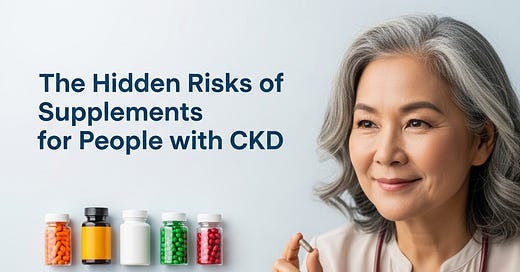The Hidden Risks of Supplements for People with CKD
Uncovering the Hidden Dangers of Supplements in CKD
If you're living with chronic kidney disease (CKD), you’ve likely searched for ways to feel better, slow progression, or simply boost your energy. One common route many patients explore is dietary supplements—from vitamins and minerals to herbal extracts and traditional remedies.
But here's something most people don’t know (and that few supplement sellers will ever tell you):
Supplements can cause serious harm to your kidneys.
And if you already have CKD, that risk is even greater.
Why Supplements Aren’t Like Medications
Unlike medications, supplements are not required to go through rigorous testing for safety, efficacy, or adverse effects before being sold. That means:
There’s no guarantee they work
There’s no guarantee they’re safe
And perhaps most importantly: there’s no system in place to track or report the damage they might cause
With prescription medications, if something causes kidney injury, it’s monitored. The drug may be required to carry a warning, or even be taken off the market. But if a supplement harms your kidneys? It may never be reported, investigated, or removed from store shelves.
That’s what makes supplements especially risky for people with CKD.
The problem isn’t just whether they “work” — it’s what they might do to you that no one’s watching for.
What Can Go Wrong: Nephrotoxicity
Many supplements have been associated with a condition called nephrotoxicity — kidney damage caused by exposure to a harmful substance. This damage can lead to:
Impaired filtration, meaning your kidneys can't clear waste properly
Tubular dysfunction, where the kidney’s ability to reabsorb nutrients is compromised
Glomerular damage, which can cause protein or blood to appear in your urine
And in serious cases, nephrotoxicity can lead to acute kidney injury, worsening of CKD, or even kidney failure.
Examples of Potentially Harmful Supplements
A large body of research has shown that many popular supplements offer little benefit to people with CKD — and some may actually cause harm. For example:
High-dose Vitamin C – can increase oxalate levels, which may damage the kidneys
Protein powders – can stress kidney function, especially in early-stage CKD or undiagnosed cases
Omega-3 fatty acids – widely used, but recent reviews show little benefit in improving kidney outcomes
Traditional or herbal remedies – especially those containing aristolochic acid (found in some Chinese herbs) are known to cause severe kidney damage
Even so-called “natural” products like cherry extract or ginseng can alter blood pressure, electrolyte balance, or act like NSAIDs (non-steroidal anti-inflammatory drugs), triggering kidney inflammation.
And shockingly, studies have found that 8% of U.S. adults take supplements that may be harmful, often without knowing it.
The Truth About Vitamin D, Omega-3s, and Other Popular CKD Supplements
According to a systematic review by Pei-Chin Lin et al., several commonly used supplements have low to very low scientific evidence supporting their benefits for people with chronic kidney disease (CKD). These include:
Vitamin D and its analogues
Omega-3 polyunsaturated fatty acids (Omega-3 PUFA)
Dietary fiber
Coenzyme Q10 (CoQ10)
Probiotics, prebiotics, and synbiotics ("biotics")
While these supplements are often promoted for improving inflammation, kidney function, or proteinuria, the review found that their actual clinical impact is minimal. Most importantly, they did not improve overall CKD prognosis.
The authors highlight the need for larger, long-term randomized trials to better understand if any true benefit exists. Until then, patients should be cautious, especially considering the potential risks and lack of regulation around supplement use.
Why a Healthy Diet Is Safer and More Effective
In most cases, the safest and most effective way to support your kidneys is not with supplements — but with food. Here's why:
Whole foods offer nutrients in natural combinations your body recognizes and absorbs better
A good diet supports not just kidney health, but also heart health, immune function, and energy
Food is less likely to interact with medications or cause unpredictable spikes in potassium, phosphorus, or other dangerous imbalances
Long-term, healthy eating habits reduce the risk of disease progression and help you feel better
While certain patients may benefit from a carefully chosen supplement under medical supervision, food should always be your first medicine — especially if you have CKD.
Bottom Line
If you’re living with kidney disease and thinking about supplements — stop and ask these questions:
Do I know how this supplement will affect my kidneys?
Was it recommended by a nephrologist or registered dietitian?
Could the same benefits come from adjusting my diet instead?
In most cases, the risk isn’t worth it. Supplements may seem “natural” and safe, but for someone with CKD, they can cause silent harm that builds over time. What you take to help might actually be hurting.
Whenever possible, choose food first.
And before adding anything to your routine — talk to a healthcare professional who understands your kidneys.
Here are the studies that support the information shared in this post.
1 - A case of severe nephrotoxicity associated with long-term dietary supplement use
2 - Renal risks of dietary complements: a forgotten cause
4 - Americans' use of dietary supplements that are potentially harmful in CKD
5 - Systematic Review of Nutrition Supplements in Chronic Kidney Diseases: A GRADE Approach
This post is sponsored by MetaSano – a science-based food tracking app made for people with CKD.
Download MetaSano today and start building a daily habit that protects your future.
Start your free 7-day trial. After that, it's less than $0.10 a day.
Have you ever tried a supplement that made you feel worse? Or felt unsure about something you bought at a health store?
Hit reply or leave a comment — I’d love to hear your experience.
Stay safe,
Ewerton
CEO of MetaSano
Kidney Health Coach
Member of the Société québécoise de nephrologie
Gerontologist
Living with CKD since 2016


